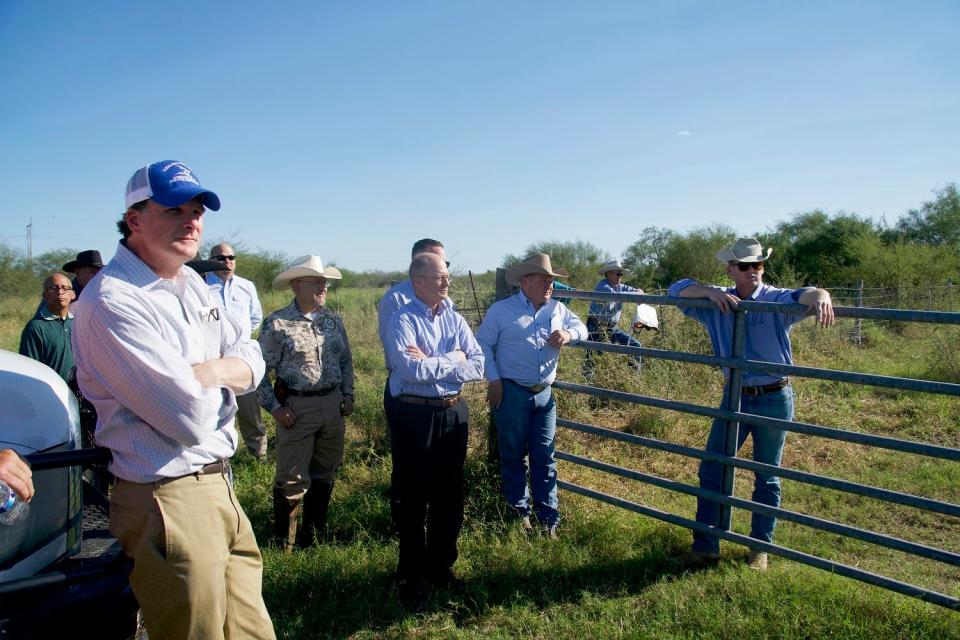Texas A&M Kingsville researchers aim to decrease environmental impact of cattle
Texas A&M University-Kingsville is working to reduce the environmental impact of cattle, a major source of greenhouse gas emissions in the U.S.
Last week, the university was awarded more than $4.7 million to help ranchers breed and raise animals who produce less methane through a USDA program aimed at expanding markets for "climate-smart" commodities. This year, the USDA has invested more than $3.1 billion in projects across the country.
"What we're trying to do is look for cattle that are more sustainable by producing less methane emissions, and we're doing that through genetic evaluation," researcher and assistant professor Ann Staiger said.
Through their natural digestive process, animals produce methane, a greenhouse gas that can impact the earth's temperature and climate. Due to human-related activities such as agriculture, methane concentrations in the atmosphere have more than doubled over the past two centuries.
"When we look at greenhouse emissions, the goal is to have by 2050, net zero greenhouse gas emissions," Staiger said. "When we look at agriculture, there's still a high number of green house gas emissions coming from our agricultural sector."
In 2020, agriculture accounted for about 10% of all U.S. emissions, of which livestock is a big contributor.
Because of their unique digestive systems, animals such as cattle, buffalo, sheep and goats produce high levels of methane. Other animals, such as swine, horses, mules and donkeys, produce significantly less methane. In the U.S., the type of animal that produces the largest amounts of methane is beef cattle.
But, how much methane an animal produces can depend on a variety of factors, but generally, animals with lower feed intakes and those that eat high-quality feed produce less emissions.
This focus of the A&M University-Kingsville project — identifying cattle that are genetically predisposed to require less feed and giving ranchers and increasing their use in breeding.
"The hope is that through genetic selection, through genetic evaluation, we can produce these cattle that are better on the environment," Staiger said.
At the university, students will have the opportunity to learn about the technology and equipment measuring methane emissions and how much cattle are eating, knowledge they can use after graduation on their own ranches, Staiger said.
"It's not a matter of if cattle producers are going to do this, it's more of when they are going to have to start implementing these practices," Staiger said. "If we can have that genetic evaluation built in now, we're providing a tool they can easily incorporate into their current management practices."
Staiger said that participating cattle producers would also have the benefit of marketing their more-sustainable herds to consumers interested in environmentally-conscious food.
The university is working with cattle breeding companies Brahman Country Genetics, based in Wharton County, and Leachman Cattle of Colorado, as well as Zoetis, an animal health company.
"I think actually there are a lot of ranchers who are interested in sustainability because at the most basic level, what a rancher needs to succeed is land — not just land, but land that is healthy and productive," Brahman Country Genetics co-owner Rachel Cutrer said. "We care about our grasses, our water sources and our wildlife on our ranches and we understand a changing environment is a very big issue for ranchers."
Cutrer said that changes to cattle help for efficient use of resources.
"The ultimate end goal of producing beef is for food consumption," Cutrer said. "We feel that the land, the natural resources and the cattle all have to work together to present a healthy environment."
The university will measure the feed efficiency and genetic data of the Brahman Country cattle, looking to identify desirable qualities in terms of methane production.
Brahman Country has costumers who buy cattle semen and embryos from all over the world, Cutrer said.
"This has a huge global potential impact," Cutrer said. "Our ranch ships cattle semen and embryos to every continent except Antarctica... if we can be leaders in producing these cattle that are more environmentally-friendly, then our customers all around the world will take these same cattle and introduce them in their own native countries."
The project aims to eventually provide financial incentives for young or underrepresented minority farmers to purchase the sperm or embryos of cattle that tested genetically to have produced low emissions and to breed and integrate this quality into their herds.
"We're trying to provide a marketable product to underserved members of the farming community," Staiger said.
Until the genetic testing is complete, researchers won't know exactly how much the breeding program might decrease emissions, Staiger said. But research has shown the impact of past genetic selection on cattle and emissions.
One 2011 study shows a 16.3% drop in beef cattle emissions between 1977 and 2007 as producers increased meat production per animal slaughtered.
"That's just based off (genetic) selection for a more feed-efficient cow," Staiger said. "Now, by adding this extra level of selection for the reduced methane production, hopefully we can meet or exceed that."

Texas A&M University-Kingsville creates space for Mexican American history
Here's how Texas A&M University-Kingsville plans to address mental health in rural areas
Del Mar College regent steps down to take position at Texas A&M-Kingsville
This article originally appeared on Corpus Christi Caller Times: Texas A&M Kingsville researchers aim to lessen cattle emissions

